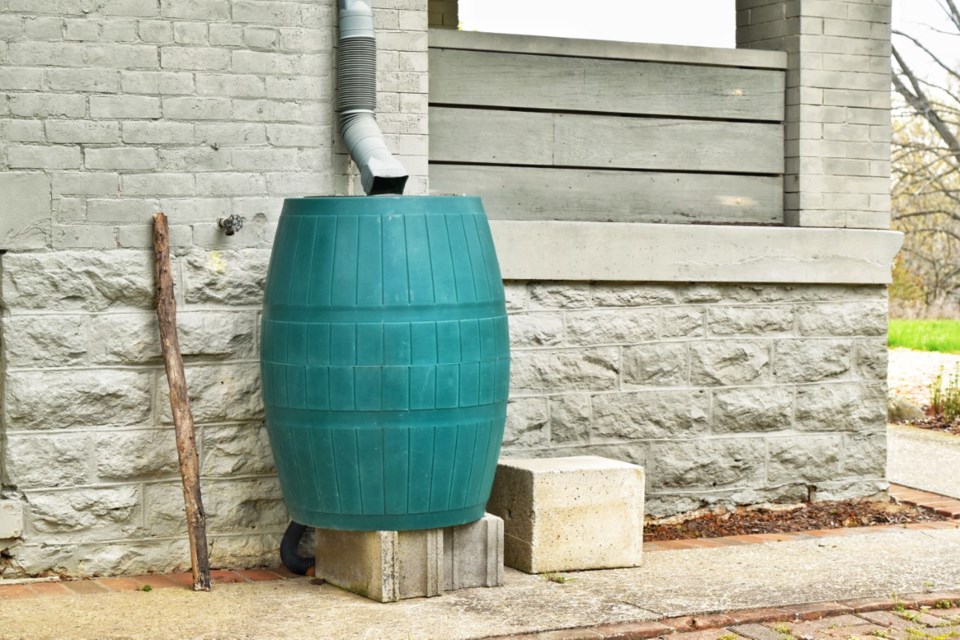Cochranites looking to be more water-wise because they believe it’s financially or environmentally responsible can take assurance that help is at hand.
Cool, clear, water – it’s something most people don’t think a lot about until it hasn’t rained for a while, or when the local government reminds them that current licensing agreements to supply the Town of Cochrane from the Bow River will expire in approximately four years.
A recent presentation sponsored by the Cochrane Environmental Action Committee laid out the benefits and details around something called Rainwater Harvesting, as explained by permaculture designer Colleen Cyca.
“We know that everything is connected, we just don’t typically live it,” she said. “There’s a ripple effect to everything we do – nature really has the solutions we need.”
Cyca said she was inspired by how interested the Cochrane area was in exploring ways to collect rainwater.
One of the reasons why collecting and using rainwater is useful is that it improves the quality of the water.
The chlorine in treated water is there to kill microbes, she said, which are vital to the environment. As a result, food that has been raised on treated water has fewer nutrients.
Collecting rainwater also slows the movement of water off property and can reduce flooding, according to Cyca.
She also noted the financial aspect: the infrastructure required to provide and maintain municipal water supplies – and then get rid of wastewater – is expensive.
She defined permaculture as “Meeting our human needs in a way that is in line with nature,” and added that her 13 years in the field have taught her a lot, including what doesn’t work.
”I can tell you all what not to do,” she said, before moving on, rather, to what to do.
It turns out there’s more to proper rain barrel usage than sticking a barrel under the downspout and draining it periodically.
The designs can get as intricate or as simple as desired. Some basic components of a well-designed system will include a leaf diverter, screened downspout, and screened inlets and outlets to the tank.
Some other common considerations include being aware that certain roofing materials have drawbacks. Some asphalt-based shingles, for example, contain fungicides to prevent moss and other organic growth, so they may not make the most desirable surface.
Cyca’s discussion of these issues centred around what’s known as the treatment train – what happens to water from the time it hits the roof as rain until after it’s stored and eventually used.
She cited a few recommended resources available to people considering adding a rainwater catchment system to their property, whether it be as simple as adding a barrel or two or a larger, integrated system.
One book in particular provides a comprehensive look at how to design a residential system: Essential Rainwater Harvesting.
And the local government is here to help as well.
Rebecca Carroll, a water systems technologist with the Town of Cochrane, said the municipality is offering a couple of different types of rebates for residents making their property more water efficient.
Carroll agreed the underlying news about the Town’s water license coming up for renewal makes water conservation more timely than ever.
“Absolutely. Collectively, the more we conserve, as a community and individually, the further our license will last,” she said.
So every time the per capita per day water usage is reduced, the longer the existing license will last.
Carroll said she hopes as many people as possible take advantage of the Town’s rebates, because “that’s what they’re there for.”
Besides rebates for costs to convert yards from grass to less thirsty alternative landscapes, the Town has upped the incentives for people to gather, store, and use rainwater.
“We’ve increased (the subsidies available) from two barrels to three this year, so that’s good – [there is] more of an opportunity for residents to take advantage of that,” she said.
This year, residents can apply for a rebate of up to $50 per barrel.
There is more information on the rain barrel rebates (and other subsidies available for water smart ideas) on the Town’s website, cochrane.ca. Searching “rain barrel rebates” will open the water rebates page, where there is a link to the application forms.
Cyca provides design consulting for those less inclined to try the DIY approach. She can be reached at [email protected].
For more information on rainwater harvesting, go to essentialrwh.com.




